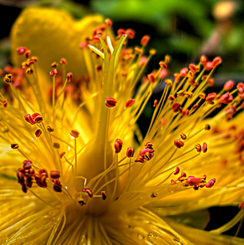 Many people suffer from symptoms of minor depression sometime in their life. Persistent sadness, moodiness, lethargy, tiredness, or suicidal thoughts can all be signs that you’re in the grips of depression. What can you do? Historically, the recommended treatment has been to take drugs such as Prozac or Zoloft—sometimes coupled with therapy. Yet, these medications present a problem for many people. First of all, getting a prescription and buying these medications can cost hundreds of dollars. Secondly, many people find that anti-depressant medications don’t work at all or they can cause unpleasant side effects. Fortunately, some people can overcome depression naturally. An inexpensive and safe alternative to anti-depressant medications has recently become popular; it’s called Hypericum—but it’s better known as St. John’s Wort.
Many people suffer from symptoms of minor depression sometime in their life. Persistent sadness, moodiness, lethargy, tiredness, or suicidal thoughts can all be signs that you’re in the grips of depression. What can you do? Historically, the recommended treatment has been to take drugs such as Prozac or Zoloft—sometimes coupled with therapy. Yet, these medications present a problem for many people. First of all, getting a prescription and buying these medications can cost hundreds of dollars. Secondly, many people find that anti-depressant medications don’t work at all or they can cause unpleasant side effects. Fortunately, some people can overcome depression naturally. An inexpensive and safe alternative to anti-depressant medications has recently become popular; it’s called Hypericum—but it’s better known as St. John’s Wort.
How to Overcome Depression Without Medication.
St. John’s Wort is derived from a yellow-flowered plant that has been ingested around the world for some 2,000 years. In 1994, the venerable Journal of Geriatric Psychiatry and Neurology devoted an entire issue to Hypericum. One study done with 3,250 patients suffering from mild and moderate depression found that 80 percent of them felt better, or completely free of symptoms, after four weeks. In Germany St. John’s Wort is the leading treatment for depression and is prescribed 25 times more frequently than Prozac. Best of all, St. John’s Wort can be picked up at your local health food store without a prescription, and costs a lot less than any anti-depressant on the market.
Although more research needs to be done on Hypericum/St. John’s Wort, by all accounts it is a great way for overcoming depression without traditional medications. Approximately 2.4% of those trying the herb experience side effects—ranging from restlessness to mild allergic reactions. The percentage of people who report side effects from Prozac or Zoloft is markedly higher. For example, approximately 20% of people who take Prozac experience headache, digestive difficulties and/or insomnia. While Hypericum may make some people sensitive to the sun, the absence of serious side effects is one of its biggest selling points.
If you suffer from mild or moderate depression from time to time
consider trying  Hypericum as a way to overcome depression naturally. The recommended dosage is 300 milligrams of Hypericum extract, containing 0.3 percent of the active ingredient Hypericum, three times a day. It takes between one and four weeks for the herb to start working. Since it takes awhile for this medicine to have an effect, avoid trying it in response to momentary sadness or lethargy. Yet, if you feel depressed for several weeks, there is little to risk and potentially a lot to gain from trying St. John’s Wort.
Hypericum as a way to overcome depression naturally. The recommended dosage is 300 milligrams of Hypericum extract, containing 0.3 percent of the active ingredient Hypericum, three times a day. It takes between one and four weeks for the herb to start working. Since it takes awhile for this medicine to have an effect, avoid trying it in response to momentary sadness or lethargy. Yet, if you feel depressed for several weeks, there is little to risk and potentially a lot to gain from trying St. John’s Wort.
Due to the fact that I’m a therapist and not a psychiatrist, I’m not able to prescribe medication. Frequently, clients would come to my office feeling depressed, but they lacked the funds to see a psychiatrist. In addition, some clients simply refused to take drugs such as Prozac because they didn’t like the side effects or how it made them feel. When I heard about Hypericum, I began suggesting it to clients I thought could benefit from its use. In almost every case, glowing reports came back to me. Many of the clients who had previously taken anti-depressants reported they liked Hypericum better. Several of my clients said they experienced fewer side effects and/or found it to feel “more natural” than the previous medications they had tried.
If you try Hypericum or other anti-depressant remedies,
it’s important not to use them to avoid looking at important issues in your life. Depression can often be a sign that certain aspects of your life are not working. A good therapist or a good book that deals with a therapeutic approach to depression can be an important part of your recovery; the book Feeling Good by Dr. David Burns is a good place to start. Although psychotherapy can be expensive, it can beat the cost of spending the rest of your life running from yourself. If you decide to try therapy as part of your treatment, ask friends if they know of anyone they can recommend. Another option is to call several therapists and talk to each of them on the phone to see which one feels right for you.
 Hypericum is not a cure-all for depression and sadness. Yet, for many people it can be an enormous help. If, after using Hypericum for four to six weeks, you don’t notice any improvement, consider seeing a psychiatrist for his or her recommendation. If you keep trying new medications and/or forms of therapy, you’ll eventually find something that helps. Don’t give up hope. Even severely depressed people have been known to bounce back to a feeling of contentment after finding a treatment that was right for them. Good luck on your search
Hypericum is not a cure-all for depression and sadness. Yet, for many people it can be an enormous help. If, after using Hypericum for four to six weeks, you don’t notice any improvement, consider seeing a psychiatrist for his or her recommendation. If you keep trying new medications and/or forms of therapy, you’ll eventually find something that helps. Don’t give up hope. Even severely depressed people have been known to bounce back to a feeling of contentment after finding a treatment that was right for them. Good luck on your search


 You are living in a dangerous cult. I mean it. Of course, like most people in cults, you don’t think it’s dangerous—or that it’s even a cult. This “cult” that you (and I) are living in is the hyper capitalist economic system of modern day life.
You are living in a dangerous cult. I mean it. Of course, like most people in cults, you don’t think it’s dangerous—or that it’s even a cult. This “cult” that you (and I) are living in is the hyper capitalist economic system of modern day life. happiness that we are all on, you can’t assume anything that you’ve heard. Unfortunately, our culture is constantly pushing its ideas about finding the “good life” onto us, and that brainwashing does not necessarily have anything to do with being happy. After all, does Donald Trump look joyous to you? In the last twenty years, the average GDP of Chinese citizens has gone up 400%, and yet their average level of happiness has actually gone down.
happiness that we are all on, you can’t assume anything that you’ve heard. Unfortunately, our culture is constantly pushing its ideas about finding the “good life” onto us, and that brainwashing does not necessarily have anything to do with being happy. After all, does Donald Trump look joyous to you? In the last twenty years, the average GDP of Chinese citizens has gone up 400%, and yet their average level of happiness has actually gone down. Here’s just one example. Highly contented people tend to schedule time each week for activities they truly enjoy. On the other hand, unhappy people tend to make excuses as to why they don’t have time for what they really like to do. Here’s another example. Happy people make being with friends and enjoying life a central priority in their life, whereas less contented folks make things like making money their main priority.
Here’s just one example. Highly contented people tend to schedule time each week for activities they truly enjoy. On the other hand, unhappy people tend to make excuses as to why they don’t have time for what they really like to do. Here’s another example. Happy people make being with friends and enjoying life a central priority in their life, whereas less contented folks make things like making money their main priority. that the American Dream is actually a repetitive, busy, and not too unpleasant nightmare. I soon realized that always striving for more, always being busy, and constantly competing for recognition was not a path to greater peace of mind. As I began to see through the brainwashing of Western culture, I began to notice what really made me happy. What really made me happy wasn’t having bouncy hair, a big house, or a Mercedes. It ends up it was little moments of depth and joy I could find in everyday life. Nowadays, I spend more time playing with my dog, watching sunsets, hanging out with my friends, reading great books, and meditating.
that the American Dream is actually a repetitive, busy, and not too unpleasant nightmare. I soon realized that always striving for more, always being busy, and constantly competing for recognition was not a path to greater peace of mind. As I began to see through the brainwashing of Western culture, I began to notice what really made me happy. What really made me happy wasn’t having bouncy hair, a big house, or a Mercedes. It ends up it was little moments of depth and joy I could find in everyday life. Nowadays, I spend more time playing with my dog, watching sunsets, hanging out with my friends, reading great books, and meditating.
